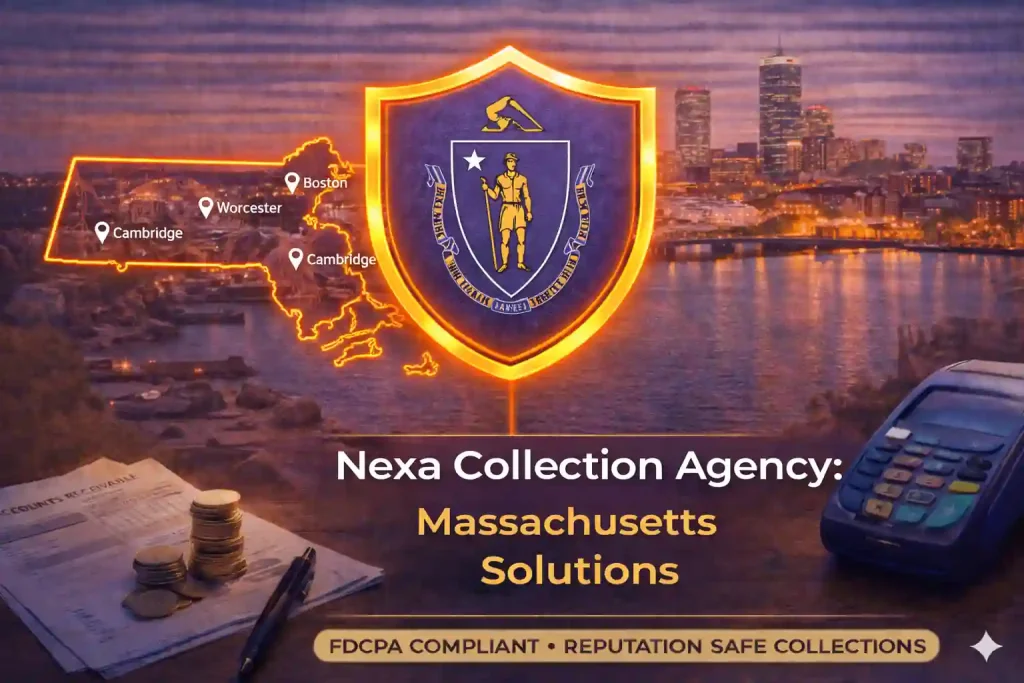
In Massachusetts—from the biotech labs of Kendall Square and the industrial hubs of the Pioneer Valley to the “Education Capital” of the world in Boston—business is driven by innovation and strict regulation. In 2026, Massachusetts is no longer a standard collection state. With the Division of Banks’ 2025 Regulatory Update and the new 3% interest cap on medical judgments, national agencies are struggling to stay compliant. You don’t just need a collector; you need a Massachusetts-licensed strategist who can recover your funds without triggering a Chapter 93A lawsuit that could cost you triple the original debt.
Nexa provides 100% reputation-safe, equipped with all 50-state collections license, offering free credit reporting, free litigation/bankruptcy scrubs, and zero onboarding fees. Secure – SOC 2 Type II & HIPAA compliant.
Need a Collection Agency? Contact us
The Massachusetts Legal Landscape
Massachusetts offers a generous 6-year statute of limitations, but it imposes some of the tightest communication limits in the country (e.g., the “2-calls-per-week” rule).
| Debt Type | Statute of Limitations | MA General Law (MGL) |
| Written & Oral Contracts | 6 Years | MGL c. 260, § 2 |
| Medical Debt Judgments | 20 Years | 3% Interest Cap (2026) |
| Wage Garnishment | ALLOWED (15% Cap) | MGL c. 246, § 28 |
| Consumer Protection | TRIPLE DAMAGES | MGL c. 93A |
Critical Massachusetts Rules for 2026:
-
The 93A “Triple Damage” Shield: Massachusetts law (Chapter 93A) allows courts to award double or triple damages plus attorney fees if a collection effort is deemed “unfair or deceptive.” Nexa’s “Compliance-First” model is specifically designed to prevent these nuclear legal outcomes for our clients.
-
2026 Medical Debt Shift: As of January 1, 2026, interest on medical debt judgments is capped at a fixed 3% per annum. Additionally, medical debt garnishments now have a massive exemption floor: 65 times the state minimum wage (approx. $1,056/week) is protected from creditors.
-
Call Frequency (2025 Update): The Division of Banks now strictly limits collectors to two telephone calls per debt in any 7-day period. Nexa’s automated dialing tech is hard-coded to these limits to ensure you stay 100% compliant.
-
Minimum Wage Garnishment Floor: With the 2026 minimum wage increase to $16.25/hour, the amount of income protected from general garnishment has risen. We identify high-earning debtors to ensure your legal spend results in actual recovery.
Cost-Effectiveness: The Nexa Advantage
-
Fixed-Fee Recovery ($15/account): Ideal for early-stage receivables. Debtors pay 100% directly to you. No commissions.
-
Contingency Service (20%–40%): Performance-based recovery. No Recovery, No Fee. We take the risk; you get the revenue.
Industries We Serve in Massachusetts
-
Biotech & High-Tech Manufacturing: Specialized B2B recovery for the Kendall Square and Route 128 corridors. We handle high-value sub-contractor disputes and complex supply chain receivables.
-
Healthcare & Medical: 100% HIPAA-compliant. We are experts in the 2026 3% Interest Cap and new garnishment exemptions, ensuring your medical billing stays liquid while preserving community reputation.
-
Colleges & Universities: Serving the “Education Capital.” We manage tuition and bursar recovery with a diplomatic approach that protects the brand of the world’s most prestigious academic institutions.
-
K-12 Private & Charter Schools: Diplomatic recovery for unpaid enrollment and textbook fees, tailored for Massachusetts’ elite private school landscape.
-
Accountants & CPA Firms: Recovery of professional service fees. We understand the Massachusetts tax cycle and recover your fees without triggering the aggressive “debt collector” stigma.
-
Banks & Credit Unions: Expert handling of delinquent consumer loans and deficiency balances using the state’s 20-year judgment renewal window.
-
Construction & Trades: Revenue recovery for HVAC and general contractors. We are experts in MGL c. 254 (Mechanic’s Liens) and the strict “Notice of Identification” timelines.
-
B2B Commercial, Restoration & Waste Management: High-speed recovery for service providers who need cash flow restored immediately to manage the high cost of doing business in Massachusetts.
Recent Massachusetts Recovery Results
Case 1: Boston-Area Specialty Medical Group (Medical)
-
The Problem: $180,000 in patient balances. The clinic was terrified of Chapter 93A lawsuits and the 2026 reporting changes.
-
The Result: Nexa used a diplomatic “compliance-certified” mediation strategy, recovering $122,000 in 90 days with zero patient complaints or legal threats.
Case 2: Worcester-Based Industrial Supplier (B2B)
-
The Problem: A $55,000 unpaid equipment contract from a vendor who claimed “financial hardship.”
-
The Result: Leveraging the 6-year written contract statute, we secured a full $55,000 recovery plus costs within 45 days of the initial demand.
Frequently Asked Questions (FAQ)
1. Is it true that medical debt interest is capped in Massachusetts?
Yes. For any medical debt judgment entered on or after January 1, 2026, interest is legally limited to 3% annually. Nexa’s systems are pre-set to this rate to ensure your judgments are legally sound.
2. What is the “2-call” rule in Massachusetts?
The Division of Banks (209 CMR 18.00) prohibits debt collectors from calling a consumer more than twice in a 7-day period for a single debt. Nexa’s compliance tech automates this limit to protect you from heavy fines.
3. Can you garnish wages for business debt in Massachusetts?
Yes. Following a court judgment, you can garnish up to 15% of gross wages, provided the debtor’s income exceeds the state’s high minimum-wage floor protections.
Popular Cities:
